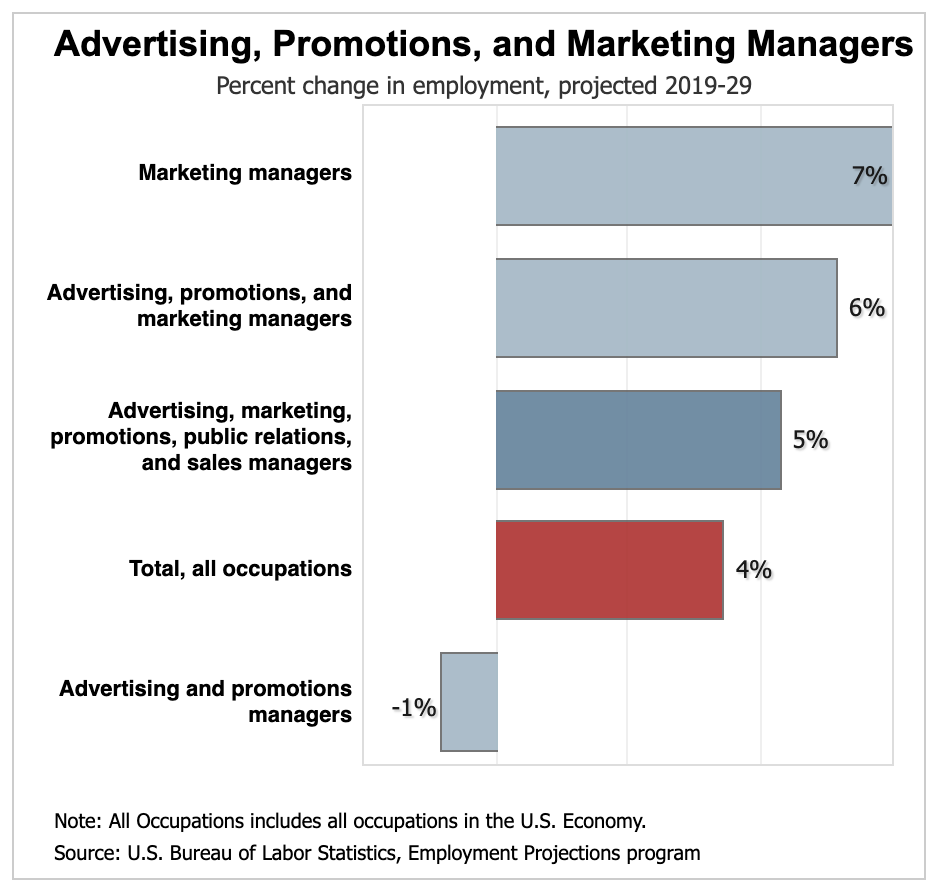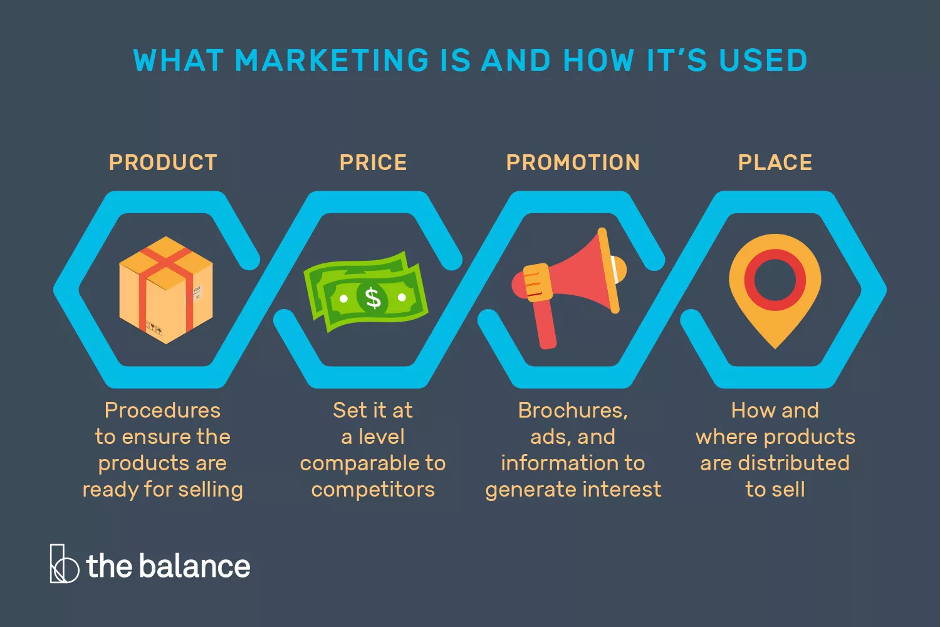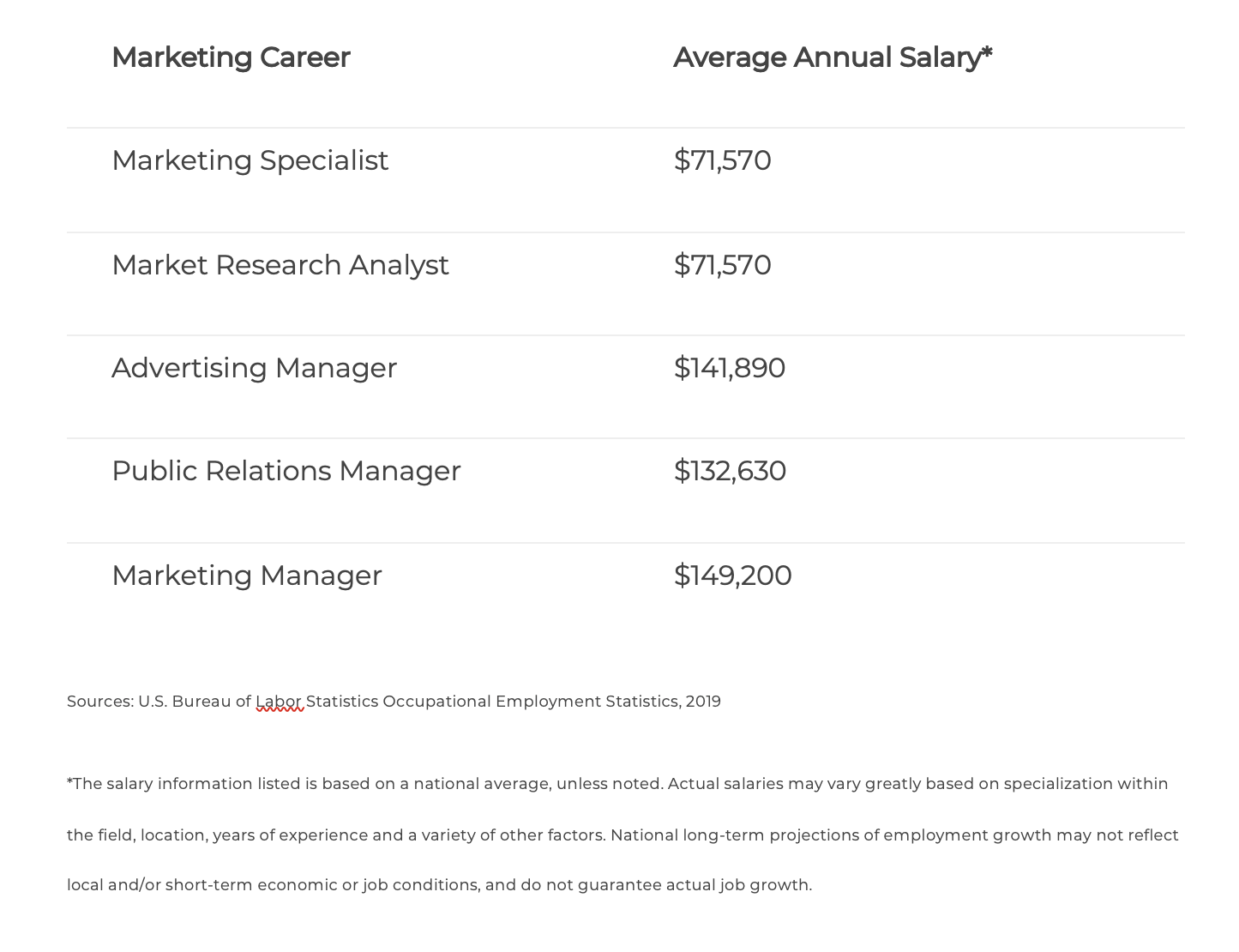Marketing Career FAQ
Looking to start a marketing career?
Employment of marketing managers in the US is projected to grow 7% from 2019 to 2029, faster than the average for all occupations:

But is marketing the right career for you? And if so, how do you get started?
Look no further, as the Loomly Team answers all your burning questions in this marketing career FAQ.
Table of contents
- What is marketing?
- What does a marketing career look like?
- What careers are in marketing?
- Is marketing a good career option?
- Is it hard to get a job in marketing?
- How can I learn marketing?
- How do I start a career in marketing?
- Is marketing hard to study?
- Is a marketing degree worth it?
- What is the best degree to start a marketing career?
- How fast can I get a marketing degree?
- What does a marketing professional do?
- Which marketing skills are the most in-demand?
- Is marketing a stressful job?
- Which marketing jobs pay the most?
What is marketing?
According to the American Marketing Association (AMA), marketing is the activity, set of institutions, and processes for creating, communicating, delivering, and exchanging offerings that have value for customers, clients, partners, and society at large.
HubSpot adds that marketing is the process of getting people interested in your company’s product or service. This happens through market research, analysis, and understanding your ideal customer’s interests. Marketing pertains to all aspects of a business, including product development, distribution methods, sales, and advertising.
There are three primary purposes of marketing:
- Capturing the attention of your target market.
- Persuading a consumer to purchase your product.
- Providing the customer with a specific, low-risk action that is easy to take.

Credit: The Balance Small Business
What does a marketing career look like?
A career in marketing can include several different roles, from online marketing positions to more traditional marketing jobs like television, radio, or billboard marketing.
Your role can vary based on the business requirements and your skillset. Some might work within social media communities, while others might run online ads. The job description and responsibilities can vary significantly from one company to another.
Depending on the role, marketing careers can require specific industry knowledge such as consumer behavior, sales, market research, and competitor analysis. Experience is important in this field, but some employers might not hire people without degrees.
Because of the diversity, there is no set career path in marketing. You could start in one area and move into another as you gain more experience and new technologies emerge.
What careers are in marketing?
There are many different marketing jobs and careers. Any given marketing department has a variety of positions, projects, and goals. The difference between these roles can be minute or major — it all depends on what medium they’re working with, what they’re promoting, and who they’re promoting to.
Here are some of the marketing functions and positions you might pursue in a marketing career.
Digital Marketing
Refers to marketing through digital channels like search engines, websites, email, and mobile apps.
- Search Engine Optimization (SEO) Specialist
- Search Engine Marketing (SEM) Specialist
- Advertising (PPC) Specialist
- Email Marketer
- Email Marketing Manager
- Ecommerce Manager
- Growth Marketer (Growth Hacking)
Content Marketing
Content marketing, since it’s mainly executed online, could be considered a segment of digital marketing. But it’s often spoken about separately.
- Content Marketer
- Copywriter
- Graphic Designer
- Videographer
- Social Media Marketer
- Social Media Manager
- Conversion Rate Optimization (CRO) Specialist
Product Marketing
Product marketing is all about setting the tone for how, where, when, and why a company’s products and services are promoted.
- Product Marketer
- Product Manager
Brand Marketing
Consumer behavior has paved the way for roles in brand management and public relations.
- Brand Marketer
- Brand Manager
- PR Manager
Event Marketing
Company-run events are a popular way to interact with and entertain potential customers and clients.
- Event Marketer
- Promotions Manager
Marketing Analysis
In the marketing world, numbers and data is king.
- Market Research Analyst
- Marketing Analyst
- Data Scientist
Senior Marketing Roles
- Marketing Manager
- Marketing Director
- Chief Marketing Officer
Is marketing a good career option?
Marketers work across all industries, including banking, insurance, accountancy, management consulting firms, startups, education, and leisure and tourism.
Like all jobs, there are pros and cons to a marketing career.
Pros:
- Marketing graduates receive a decent salary.
- According to PayScale, the average salary package for a marketing manager in the US is around $65,757.
- According to the United States Bureau of Labor Statistics (BLS), the median annual wage for marketing managers was $136,850 in May 2019. The lowest 10% earned less than $71,010, and the highest 10% earned more than $208,000.
- Many marketers have the opportunity to travel to different cities/countries as part of their role.
- Marketing has to move with current trends, so the job will never become monotonous.
- You can explore various career opportunities in marketing as it’s a broad and diverse field.
Cons:
- Due to the diverse job roles and responsibilities, sometimes you might feel that your job is quite stressful.
- Marketing jobs might require you to work for long hours as it requires a huge investment of time, energy, and effort when planning and running some campaigns.
Is it hard to get a job in marketing?
The consensus from the marketing subreddit is that it’s not hard to get a job in marketing.
Here are a few comments from the thread:
“No, it’s not. But it’s the 100k a year jobs everyone seems to think is the norm that is hard to get.”
“It’s not hard, but it’s not what you’d expect either. Marketing is very broad, so find your niche and get good at it. I went to school for advertising, and I use my education daily at work. I thought my niche would be marketing research, but my full-time career includes everything from graphic design to magazine editing to web design, which I never expected. However, on the side, I’ve found my niche freelancing in the realm of family-owned restaurant branding. You’ll gain your footing as you go.”
“I’d advise being selective about your first job in marketing, though. Many many companies use “marketing” as a buzzword to mean whatever they want it to mean. Often this includes sales, call centers, and standing in Walmart, getting people to sign up for cable. Instead, look at non-profit orgs and those random associations that nobody thinks about, like the Fencing Association. Places like that are always looking for talent, and they are great first-jobs in marketing because it’s low stress (sometimes), you’re rarely generating leads as these orgs have a membership base not controlled by the marketing dept. AND you can try stuff out and make mistakes without creating a pr crisis with every tweet.”
“Or just go work at an agency as your first job. If you’re fine not leaving the office for two years, agency work is often the best way to start a career.”
“I wouldn’t say that it’s hard, but in terms of money and career advancement, you would probably (from what I’ve seen) get better value by entering the field with a degree in some specific subfield of marketing: design, videography, creative writing… even something related to math or data.
There is no such job as just “I’m a marketer.” That’s where many people screw up. They think about the field in generalities and think the entry-level role is going to be Don Draper.”
“It’s not hard to get a job in marketing, but if you want to get a good one and work your way up to a high paying position or director role somewhere, it’s probably better to specialize in one specific area. For example, PPC, SEO, Social Media, Email Marketing, etc. You’ll be able to command more salary, and you can always do a CIM course or something later on to learn the skills needed to step into management.”
How can I learn marketing?
Creative Boom has put together the following list of the 25 best (FREE) resources to help you learn marketing:
- Content Marketing Reference Library
- The Beginner’s Guide to SEO
- Social Marketing Success Kit
- Social Media Calendar
- Learn Marketing
- The Moz Local Learning Center
- HubSpot Social Media Blog
- The Essential List of Startup Marketing Resources
- Creating Content That Converts
- The Multi-Channel Content Distribution Guide
- Distributing Content Marketing – The Complete Guide
- The Beginner’s Guide to Social Media
- Advanced Content Promotion Checklist and Guide
- 48 Content Marketing Tools
- The Beginner’s Guide to Link Building
- 212 Blog Post Ideas
- The Definitive Guide to Content Marketing
- Primer
- Marketing Certifications from HubSpot
- The Complete Guide to Building Your Content Marketing Workflow
- Email Marketing Field Guide
- CoSchedule’s Resource Library
- The Ultimate How-to Marketing Guide
- Marketing Guides
- The Learning Center
How do I start a career in marketing?
Johannes Kanter from Getting Growth shares the following steps to starting a career in marketing:
- Is marketing for me? Do your homework!
- Figure out what marketing field suits you the best.
- Research job requirements.
- Get to know the field – take some courses and get coaching.
- Attend events and expand your network of contacts.
- Start a blog or vlog.
- Do some free work.
- Work out your service fee and get your first paying customer.
- Set long-term goals and decide if you want to be a freelancer or an employee.
- Start a healthy habit of continuous learning about your field.
Is marketing hard to study?
According to the Wandering Educators, marketing is among the most difficult majors. It’s all about data collection and analysis, learning how to develop effective communication and marketing strategies, the four P’s (place, price, promotion, product), and so much more.
A marketing career is hard not only because of all the information and strategies that you have to learn during college but also because it is a process that includes lifelong, continuous development due to new products and emerging technologies.
Other opinions on Quora suggest that marketing is no harder to study than other disciplines. But perhaps the most important aspect is turning your marketing studies into practice — that’s when things can get more challenging.
Is a marketing degree worth it?
According to Eric Hui, CEO of Single Grain, you can succeed in marketing with a bachelor’s degree in several fields, but a marketing degree makes it easier to land an entry-level job and rise in your field faster.
Here are the pros and cons of obtaining an undergraduate degree in marketing.
Pros:
- Strong foundational knowledge of most major areas of marketing.
- Greater flexibility during your job search to pursue jobs in creative or quantitative marketing disciplines.
- Good credentials to get your foot in the door in a marketing department.
- Potential for a higher starting salary.
Cons:
- Limited to marketing and sales-related careers post graduation.
- Blends both creative and analytical coursework, so unless you’re good at both, you’ll put in a lot of work in some classes.
- You may still need a graduate degree for some of the higher-paying jobs.
- There are many marketing majors out there, so competition is fierce for entry-level jobs.
Even if you miss out on a marketing undergraduate degree, a graduate program offers the knowledge and credentials you need to rise in your career. With so many options to choose from, a degree in marketing is a good idea.
What is the best degree to start a marketing career?
According to the United States Bureau of Labor Statistics (BLS), most marketing managers need a bachelor’s degree. Courses in business law, management, economics, finance, computer science, mathematics, and statistics are advantageous.
For example, computer science courses help develop an approach to maximize online traffic, by utilizing online search results, which is critical to the success of digital advertisements and promotions. Also, completing an internship while in school can be useful.
How fast can I get a marketing degree?
Depending upon your level of dedication, marketing majors can take the following time to complete:
- Associate’s degree programs, which provide entry-level opportunities, usually take two years.
- Bachelor’s degree programs take four years.
- Master’s degree programs and MBAs generally require one to two years.
What does a marketing professional do?
Marketing professionals identify the strategies and techniques used to attract customers to a business. They determine pricing based on product demand and supply, help maximize a firm’s profits, and grow market share for a business. They also aid in new product development and critique market trends.
Within the profession, there are a variety of job titles, including:
- Brand Manager
- Account Supervisor
- Business Development Executive
- Market Development Manager
- Marketing Coordinator
- Marketing Manager
- Product Manager
- Social Media Marketing Manager
The day-to-day tasks of a marketing professional could include research, market analysis, and strategy development, as well as budget management.
Which marketing skills are most in-demand?
According to Clickthrough Marketing, the most in-demand skills for digital marketers in 2020 are:
Content marketing
- Content research, including keyword research, traffic forecasts, competitor analysis.
- Competency in creating content across different formats – written, video, and audio content.
- Strategic thinking – being able to evaluate business goals and tailor an effective content strategy to achieve these outcomes.
- A data-driven mindset, helping evaluate the tangible value that each piece of content can add to a business.
Search engine optimization (SEO)
- Technical skills for schema markups, building sitemaps, and processing redirects.
- Proficiency in Local SEO.
- The ability to write engaging content that can be used to improve on-page rankings.
- Effective skills in building site backlinks.
- Experience in UX
- The ability to analyze performance data for guiding benchmarks and strategies.
- An understanding of new best practices as updates continuously evolve.
Social media marketing
- Having a creative mindset and the skills to develop engaging content.
- The ability to map user lifecycle journeys across both organic and paid social channels.
- Understanding how to implement conversion tracking and identify clear attribution models.
- Understanding how to analyze performance data and make data-driven decisions.
- An understanding of how to build and engage communities.
- Knowing how to collaborate with influencers or customers to drive user-generated content.
Data analytics
- An understanding of how to properly structure and store unique data points.
- Understanding of how to integrate cross-platform event tracking tools when measuring conversion goals.
- The ability to glean unique insights from diverse data sets.
- Proficiency with data visualization tools.
- Having the initiative to build strategies based on well-informed insights.
- A proficiency in querying languages like SQL.
Product-driven marketing and UX design
- An understanding of how to drive user acquisition and retention from internal product features.
- The ability to design engaging landing pages.
- An understanding of conversion rate optimization.
- Competence in A/B testing.
- A data-driven approach to product and UX decision making.
Is marketing a stressful job?
Did you know that marketing consistently tops the lists of “The Most Stressful Careers” or “The Most Hated Jobs In The World”?
Here’s what Cubicle Ninjas discovered:
- 80% of marketers feel they’re overloaded and understaffed.
- Marketers spend 3.84 workdays per week feeling stressed.
- Company owners are the most stressed.
- The source of stress is mostly psychological.
- It’s really hard to escape the constant stress of work.
- Work stress can come from several sources.
- Despite the stress, marketers still love what they do!
Which marketing jobs pay the most?
The variation among actual marketing salaries can be significant. Different specialties can have such vast salary differences that one marketing career can pay almost double another.
Specialization significantly boosts marketing degree salary ranges at the mid-level of a marketing career path. For instance, a general brand manager will make about $5,000 less than a package design manager, even though package design is only one part of a brand manager’s responsibilities.
Marketing salaries at the highest levels of a marketing professional’s career only tell part of the story. Stock options, bonuses, benefits, and other company perks can increase the base salary by 10% or more.
Here are some of the median salaries for popular careers in marketing:


Manage all your social media accounts in one place.
Craft, schedule, & auto-post content to all your social channels, then track analytics and manage interactions from a single, easy-to-use dashboard.
Marketing Careers in a Nutshell
A career in marketing is a reasonably safe-option to pursue as demand continues to grow for marketers across all industries.
You’ll find it easier to get started in your marketing career if you have a degree, but it’s not essential. Sure, it can be stressful at times, but as new technologies emerge, you can always move into a new marketing field.



